高中英语人教版新课标必修四自我检测练习(无答案)
文档属性
| 名称 | 高中英语人教版新课标必修四自我检测练习(无答案) | 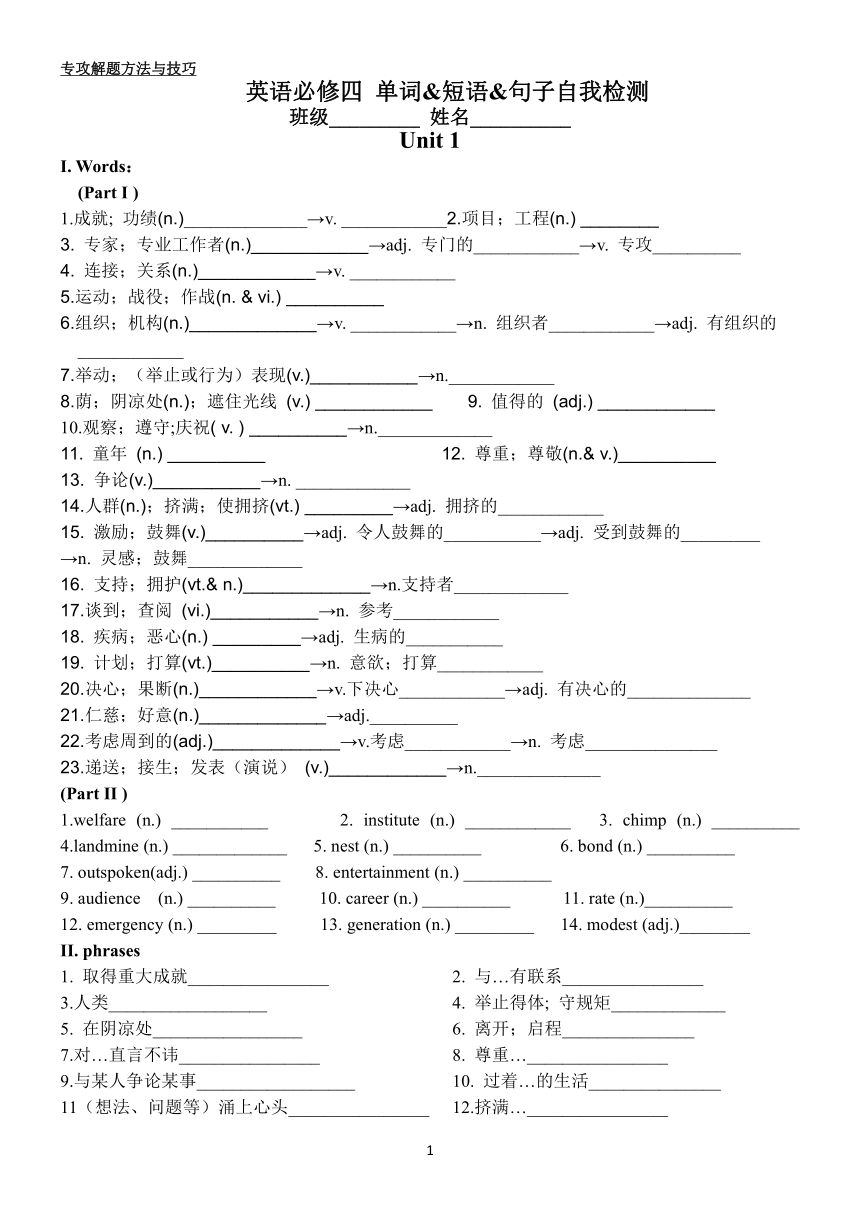 | |
| 格式 | zip | ||
| 文件大小 | 318.0KB | ||
| 资源类型 | 教案 | ||
| 版本资源 | 人教版(新课程标准) | ||
| 科目 | 英语 | ||
| 更新时间 | 2023-03-30 09:26:52 | ||
图片预览

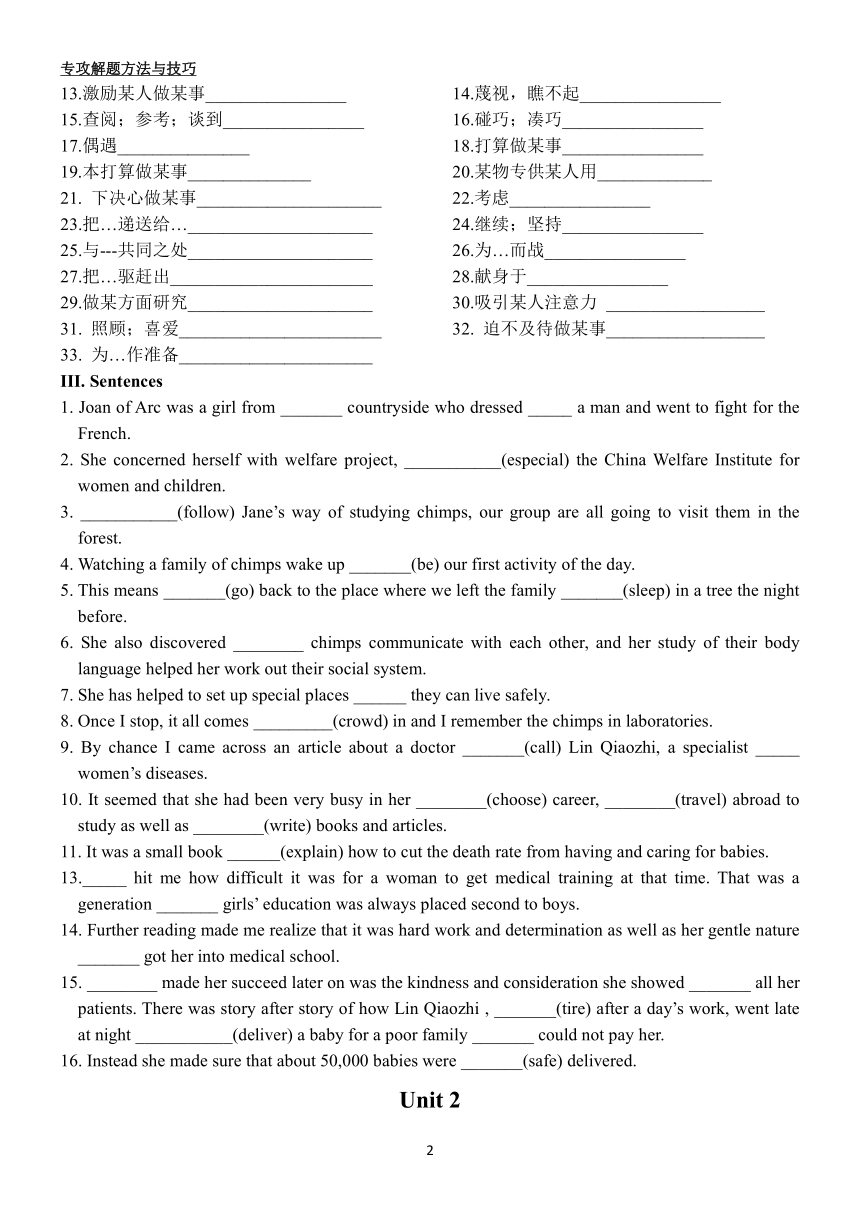
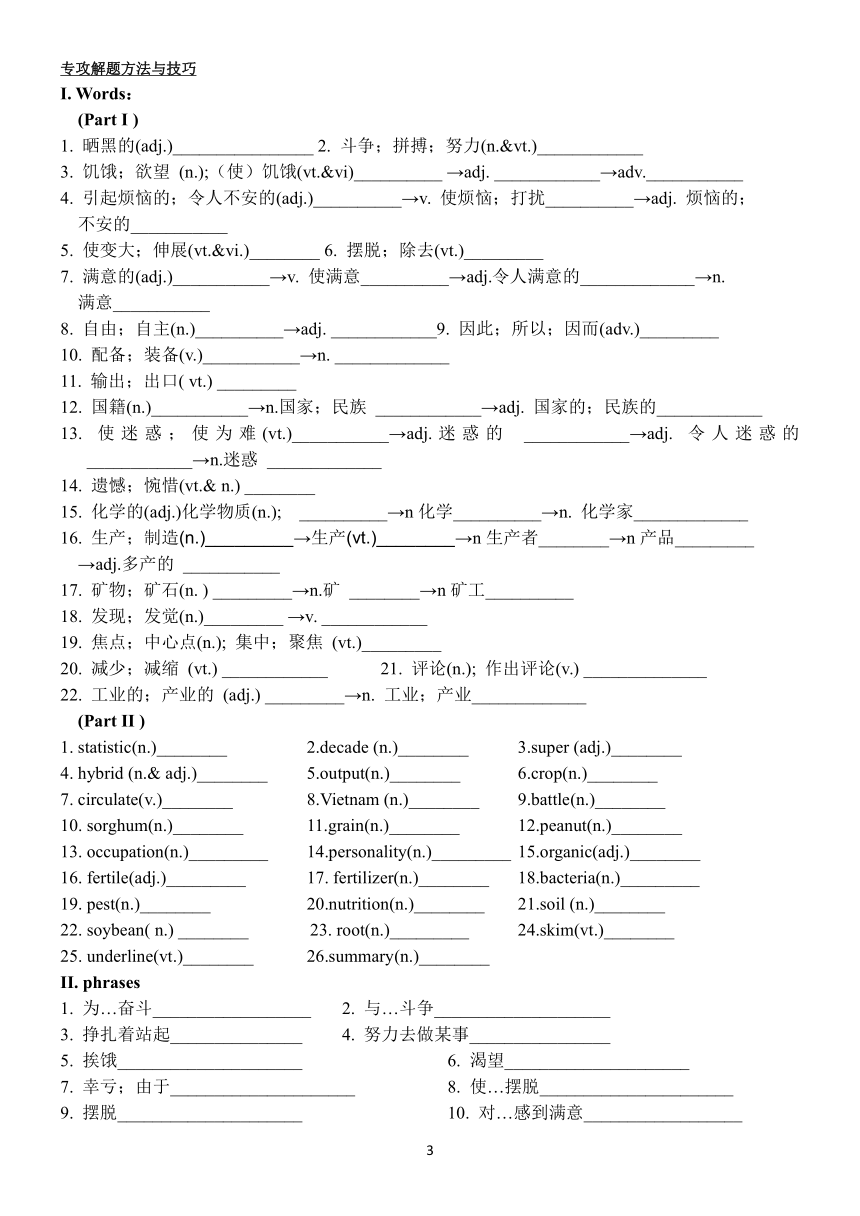
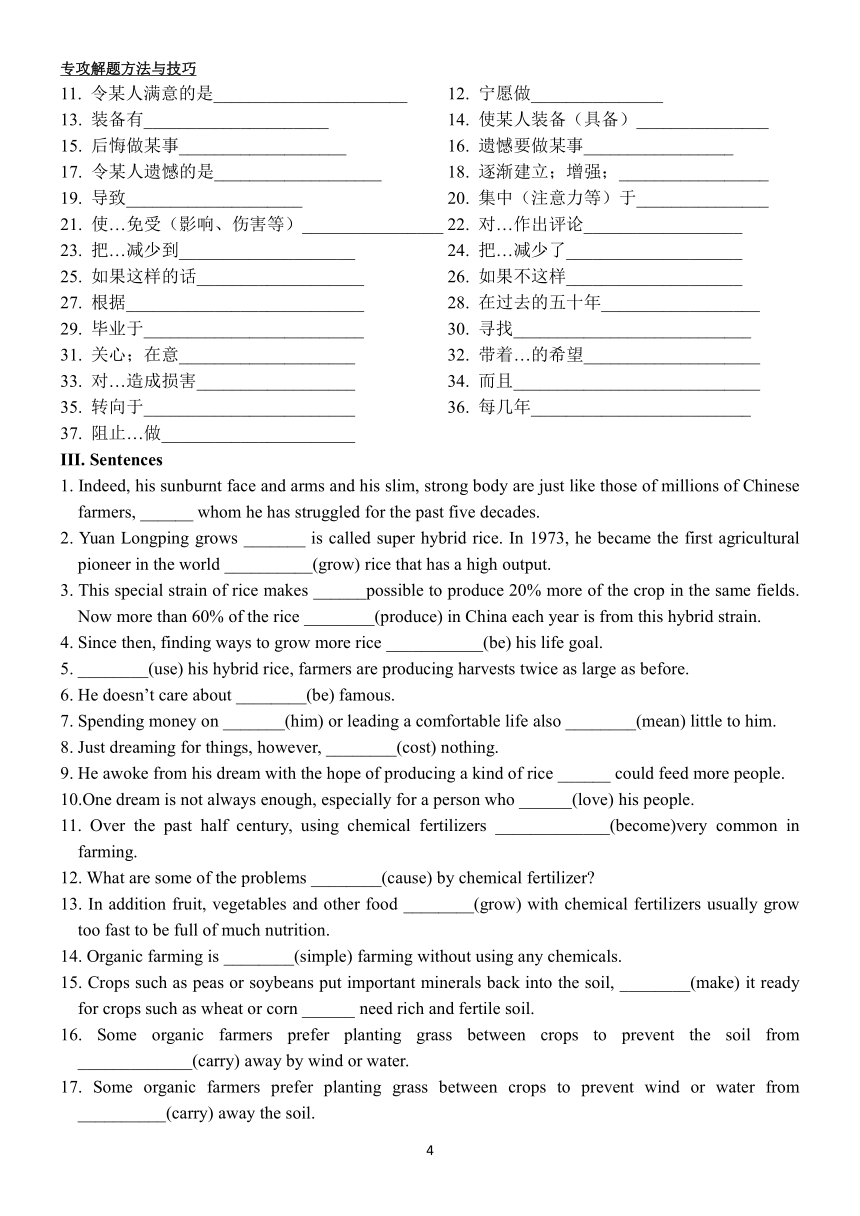
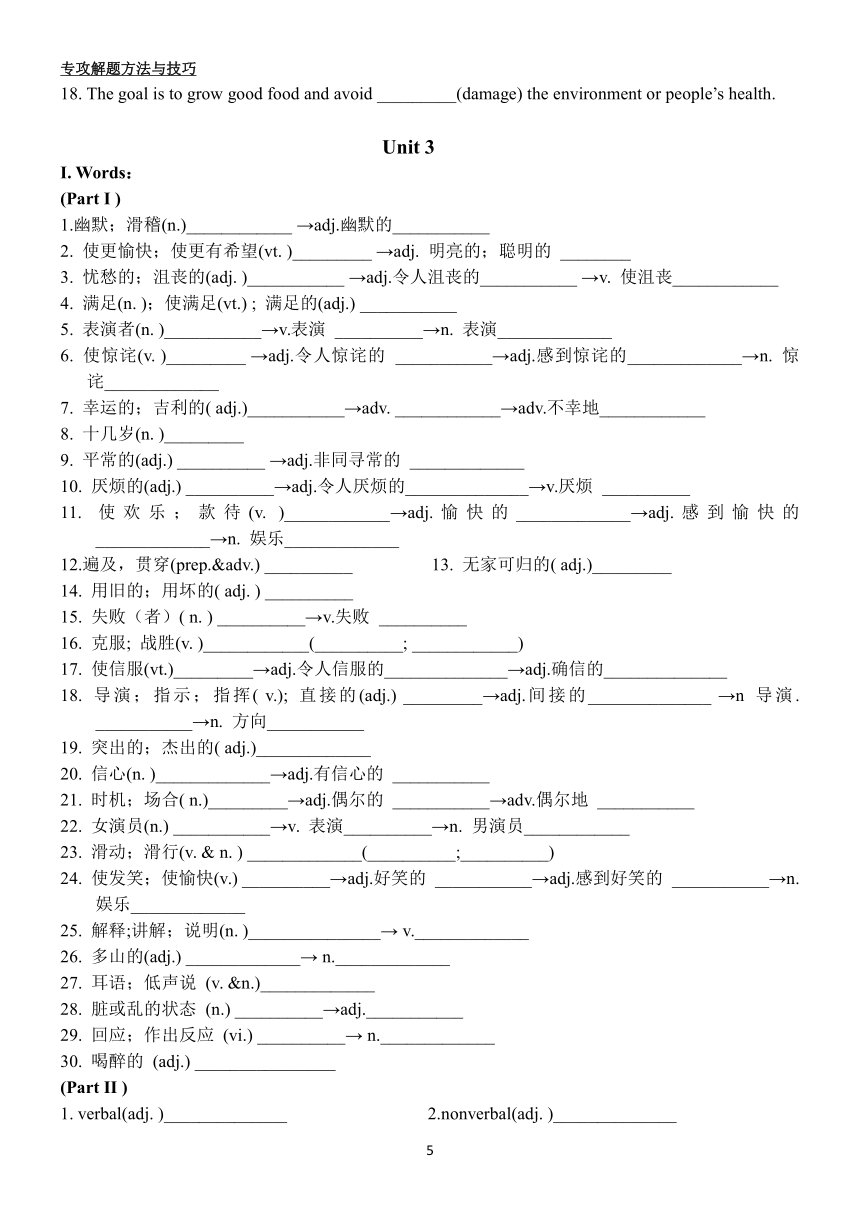
文档简介
专攻解题方法与技巧
英语必修四 单词&短语&句子自我检测
班级_________ 姓名__________
Unit 1
I. Words:
(Part I )
1.成就; 功绩(n.)______________→v. ____________2.项目;工程(n.) ________
3. 专家;专业工作者(n.)____________→adj. 专门的____________→v. 专攻__________
4. 连接;关系(n.)____________→v. ____________
5.运动;战役;作战(n. & vi.) __________
6.组织;机构(n.)_____________→v. ____________→n. 组织者____________→adj. 有组织的____________
7.举动;(举止或行为)表现(v.)___________→n.____________
8.荫;阴凉处(n.);遮住光线 (v.) ____________ 9. 值得的 (adj.) ____________
10.观察;遵守;庆祝( v. ) __________→n._____________
11. 童年 (n.) __________ 12. 尊重;尊敬(n.& v.)__________
13. 争论(v.)___________→n. _____________
14.人群(n.);挤满;使拥挤(vt.) _________→adj. 拥挤的____________
15. 激励;鼓舞(v.)__________→adj. 令人鼓舞的___________→adj. 受到鼓舞的_________
→n. 灵感;鼓舞_____________
16. 支持;拥护(vt.& n.)_____________→n.支持者_____________
17.谈到;查阅 (vi.)___________→n. 参考____________
18. 疾病;恶心(n.) _________→adj. 生病的___________
19. 计划;打算(vt.)__________→n. 意欲;打算____________
20.决心;果断(n.)____________→v.下决心____________→adj. 有决心的______________
21.仁慈;好意(n.)_____________→adj.__________
22.考虑周到的(adj.)_____________→v.考虑____________→n. 考虑_______________
23.递送;接生;发表(演说) (v.)____________→n.______________
(Part II )
1.welfare (n.) ___________ 2. institute (n.) ____________ 3. chimp (n.) __________ 4.landmine (n.) _____________ 5. nest (n.) __________ 6. bond (n.) __________
7. outspoken(adj.) __________ 8. entertainment (n.) __________
9. audience (n.) __________ 10. career (n.) __________ 11. rate (n.)__________
12. emergency (n.) _________ 13. generation (n.) _________ 14. modest (adj.)________
II. phrases
1. 取得重大成就________________ 2. 与…有联系________________
3.人类__________________ 4. 举止得体; 守规矩_____________
5. 在阴凉处_________________ 6. 离开;启程_______________
7.对…直言不讳________________ 8. 尊重…________________
9.与某人争论某事__________________ 10. 过着…的生活_______________
11(想法、问题等)涌上心头________________ 12.挤满…________________
13.激励某人做某事________________ 14.蔑视,瞧不起________________
15.查阅;参考;谈到________________ 16.碰巧;凑巧________________
17.偶遇_______________ 18.打算做某事________________
19.本打算做某事______________ 20.某物专供某人用_____________
21. 下决心做某事_____________________ 22.考虑________________
23.把…递送给…_____________________ 24.继续;坚持________________
25.与---共同之处_____________________ 26.为…而战________________
27.把…驱赶出_______________________ 28.献身于________________
29.做某方面研究_____________________ 30.吸引某人注意力 __________________
31. 照顾;喜爱_______________________ 32. 迫不及待做某事__________________
33. 为…作准备______________________
III. Sentences
1. Joan of Arc was a girl from _______ countryside who dressed _____ a man and went to fight for the French.
2. She concerned herself with welfare project, ___________(especial) the China Welfare Institute for women and children.
3. ___________(follow) Jane’s way of studying chimps, our group are all going to visit them in the forest.
4. Watching a family of chimps wake up _______(be) our first activity of the day.
5. This means _______(go) back to the place where we left the family _______(sleep) in a tree the night before.
6. She also discovered ________ chimps communicate with each other, and her study of their body language helped her work out their social system.
7. She has helped to set up special places ______ they can live safely.
8. Once I stop, it all comes _________(crowd) in and I remember the chimps in laboratories.
9. By chance I came across an article about a doctor _______(call) Lin Qiaozhi, a specialist _____ women’s diseases.
10. It seemed that she had been very busy in her ________(choose) career, ________(travel) abroad to study as well as ________(write) books and articles.
11. It was a small book ______(explain) how to cut the death rate from having and caring for babies.
13._____ hit me how difficult it was for a woman to get medical training at that time. That was a generation _______ girls’ education was always placed second to boys.
14. Further reading made me realize that it was hard work and determination as well as her gentle nature _______ got her into medical school.
15. ________ made her succeed later on was the kindness and consideration she showed _______ all her patients. There was story after story of how Lin Qiaozhi , _______(tire) after a day’s work, went late at night ___________(deliver) a baby for a poor family _______ could not pay her.
16. Instead she made sure that about 50,000 babies were _______(safe) delivered.
Unit 2
I. Words:
(Part I )
1. 晒黑的(adj.)________________ 2. 斗争;拼搏;努力(n.&vt.)____________
3. 饥饿;欲望 (n.);(使)饥饿(vt.&vi)__________ →adj. ____________→adv.___________
4. 引起烦恼的;令人不安的(adj.)__________→v. 使烦恼;打扰__________→adj. 烦恼的;
不安的___________
5. 使变大;伸展(vt.&vi.)________ 6. 摆脱;除去(vt.)_________
7. 满意的(adj.)___________→v. 使满意__________→adj.令人满意的_____________→n.
满意___________
8. 自由;自主(n.)__________→adj. ____________9. 因此;所以;因而(adv.)_________
10. 配备;装备(v.)___________→n. _____________
11. 输出;出口( vt.) _________
12. 国籍(n.)___________→n.国家;民族 ____________→adj. 国家的;民族的____________
13. 使迷惑;使为难(vt.)___________→adj.迷惑的 ____________→adj. 令人迷惑的____________→n.迷惑 _____________
14. 遗憾;惋惜(vt.& n.) ________
15. 化学的(adj.)化学物质(n.); __________→n化学__________→n. 化学家_____________
16. 生产;制造(n.)_________→生产(vt.)________→n生产者________→n产品_________
→adj.多产的 ___________
17. 矿物;矿石(n. ) _________→n.矿 ________→n矿工__________
18. 发现;发觉(n.)_________ →v. ____________
19. 焦点;中心点(n.); 集中;聚焦 (vt.)_________
20. 减少;减缩 (vt.) ____________ 21. 评论(n.); 作出评论(v.) ______________
22. 工业的;产业的 (adj.) _________→n. 工业;产业_____________
(Part II )
1. statistic(n.)________ 2.decade (n.)________ 3.super (adj.)________
4. hybrid (n.& adj.)________ 5.output(n.)________ 6.crop(n.)________
7. circulate(v.)________ 8.Vietnam (n.)________ 9.battle(n.)________
10. sorghum(n.)________ 11.grain(n.)________ 12.peanut(n.)________
13. occupation(n.)_________ 14.personality(n.)_________ 15.organic(adj.)________
16. fertile(adj.)_________ 17. fertilizer(n.)________ 18.bacteria(n.)_________
19. pest(n.)________ 20.nutrition(n.)________ 21.soil (n.)________
22. soybean( n.) ________ 23. root(n.)_________ 24.skim(vt.)________
25. underline(vt.)________ 26.summary(n.)________
II. phrases
1. 为…奋斗__________________ 2. 与…斗争____________________
3. 挣扎着站起_______________ 4. 努力去做某事________________
5. 挨饿_____________________ 6. 渴望_____________________
7. 幸亏;由于_____________________ 8. 使…摆脱______________________
9. 摆脱_____________________ 10. 对…感到满意__________________
11. 令某人满意的是______________________ 12. 宁愿做_______________
13. 装备有_____________________ 14. 使某人装备(具备)_______________
15. 后悔做某事___________________ 16. 遗憾要做某事_________________
17. 令某人遗憾的是___________________ 18. 逐渐建立;增强;_________________
19. 导致____________________ 20. 集中(注意力等)于_______________
21. 使…免受(影响、伤害等)________________ 22. 对…作出评论__________________
23. 把…减少到____________________ 24. 把…减少了____________________
25. 如果这样的话___________________ 26. 如果不这样____________________
27. 根据___________________________ 28. 在过去的五十年__________________
29. 毕业于_________________________ 30. 寻找___________________________
31. 关心;在意____________________ 32. 带着…的希望____________________
33. 对…造成损害__________________ 34. 而且____________________________
35. 转向于________________________ 36. 每几年_________________________
37. 阻止…做______________________
III. Sentences
1. Indeed, his sunburnt face and arms and his slim, strong body are just like those of millions of Chinese farmers, ______ whom he has struggled for the past five decades.
2. Yuan Longping grows _______ is called super hybrid rice. In 1973, he became the first agricultural pioneer in the world __________(grow) rice that has a high output.
3. This special strain of rice makes ______possible to produce 20% more of the crop in the same fields. Now more than 60% of the rice ________(produce) in China each year is from this hybrid strain.
4. Since then, finding ways to grow more rice ___________(be) his life goal.
5. ________(use) his hybrid rice, farmers are producing harvests twice as large as before.
6. He doesn’t care about ________(be) famous.
7. Spending money on _______(him) or leading a comfortable life also ________(mean) little to him.
8. Just dreaming for things, however, ________(cost) nothing.
9. He awoke from his dream with the hope of producing a kind of rice ______ could feed more people.
10.One dream is not always enough, especially for a person who ______(love) his people.
11. Over the past half century, using chemical fertilizers _____________(become)very common in farming.
12. What are some of the problems ________(cause) by chemical fertilizer
13. In addition fruit, vegetables and other food ________(grow) with chemical fertilizers usually grow too fast to be full of much nutrition.
14. Organic farming is ________(simple) farming without using any chemicals.
15. Crops such as peas or soybeans put important minerals back into the soil, ________(make) it ready for crops such as wheat or corn ______ need rich and fertile soil.
16. Some organic farmers prefer planting grass between crops to prevent the soil from _____________(carry) away by wind or water.
17. Some organic farmers prefer planting grass between crops to prevent wind or water from __________(carry) away the soil.
18. The goal is to grow good food and avoid _________(damage) the environment or people’s health.
Unit 3
I. Words:
(Part I )
1.幽默;滑稽(n.)____________ →adj.幽默的___________
2. 使更愉快;使更有希望(vt. )_________ →adj. 明亮的;聪明的 ________
3. 忧愁的;沮丧的(adj. )___________ →adj.令人沮丧的___________ →v. 使沮丧____________
4. 满足(n. );使满足(vt.) ; 满足的(adj.) ___________
5. 表演者(n. )___________→v.表演 __________→n. 表演_____________
6. 使惊诧(v. )_________ →adj.令人惊诧的 ___________→adj.感到惊诧的_____________→n. 惊诧_____________
7. 幸运的;吉利的( adj.)___________→adv. ____________→adv.不幸地____________
8. 十几岁(n. )_________
9. 平常的(adj.) __________ →adj.非同寻常的 _____________
10. 厌烦的(adj.) __________→adj.令人厌烦的______________→v.厌烦 __________
11. 使欢乐;款待(v. )____________→adj.愉快的_____________→adj.感到愉快的_____________→n. 娱乐_____________
12.遍及,贯穿(prep.&adv.) __________ 13. 无家可归的( adj.)_________
14. 用旧的;用坏的( adj. ) __________
15. 失败(者)( n. ) __________→v.失败 __________
16. 克服; 战胜(v. )____________(__________; ____________)
17. 使信服(vt.)_________→adj.令人信服的______________→adj.确信的______________
18. 导演;指示;指挥( v.); 直接的(adj.) _________→adj.间接的______________ →n 导演. ___________→n. 方向___________
19. 突出的;杰出的( adj.)_____________
20. 信心(n. )_____________→adj.有信心的 ___________
21. 时机;场合( n.)_________→adj.偶尔的 ___________→adv.偶尔地 ___________
22. 女演员(n.) ___________→v. 表演__________→n. 男演员____________
23. 滑动;滑行(v. & n. ) _____________(__________;__________)
24. 使发笑;使愉快(v.) __________→adj.好笑的 ___________→adj.感到好笑的 ___________→n. 娱乐_____________
25. 解释;讲解;说明(n. )_______________→ v._____________
26. 多山的(adj.) _____________→ n._____________
27. 耳语;低声说 (v. &n.)_____________
28. 脏或乱的状态 (n.) __________→adj.___________
29. 回应;作出反应 (vi.) __________→ n._____________
30. 喝醉的 (adj.) ________________
(Part II )
1. verbal(adj. )______________ 2.nonverbal(adj. )______________
3. comedy(n. ) _____________ 4. subtle(adj. )__________________
5. charming( adj.)___________ 6. tramp(n. )_________________-
7. moustache(n. )____________ 8. worn-out(adj. )________________
11. stiffly(adv. )______________ 12. optimism(n. )_________________
13. underdog(n. )_____________ 14. snowstorm(n. )________________
15. leather(n. )_______________ 16. chew( v.)_____________________
17. mouthful(n. ) _____________ 18. enjoyment(n.)_________________
19. Switzerland(n. )___________ 20. costume(n. ) __________________
21. gesture(n. )_______________ 22.particular (adj.) _________________
23. budget (n.) _______________ 24. pancake (n.) ____________________
25. detective (n.) _______________ 26. vast (adj.) ________________
27. rhythm (n. ) ________________ 28. porridge (n.) ______________
II. phrases
1.直到现在______________ 2. 对…感到满足_______________
3. 使某人惊诧的是_____________________ 4.对…惊诧________________
5. 穷的;缺少的________________ 6. 对…厌烦________________
7. 挑选出;辨别出______________________ 8. 切断;断绝____________________
9. 使某人信服某事________________________ 10. 确信某事__________________
11. 担任主角______________ 12. 对…挑剔____________________
13. 尤其地______________ 14. 自娱自乐___________________
15. 对…觉得好笑___________________ 16. 使某人感到好笑的是_____________
17. 向…解释某事__________________ 18. 低声地________________
19. 低声对某人说__________________ 20. 对…回应_________________
21. 强行闯入___________________
III. Sentences
1. Up to now, nobody ____________(be) able to do this better than Charlie Chaplin.
2. He made people laugh at a time ________ they felt depressed, so they could feel more content ______ their lives.
3. You may find _______astonishing that Charlie was taught to sing as soon as he could speak.
4. Unfortunately, his father died, __________(leave) the family even worse off, so Charlie spent his childhood ________(look) after his sick mother and his brother.
5. By his teens, Charlie _____________(become) one of the most popular child actors in England through his humor.
6. The tramp walked stiffly ________(carry) a walking stick.
7. This character was a social failure but was loved for his optimism and determination _______________(overcome) all difficulties.
8. He tries cutting and chewing the bottom of the shoe as if it it _______(be) the finest steak.
11. His acting is so ___________ (convince) that it makes you believe that it is one of the best meals he _____________(taste)
12.He lived in England and the USA but spent his last year in Switzerland, _______ he was buried in 1977.
13. I think of _______ cold the universe is and ________warm people can be in their beds.
Unit 4
I. Words:
(Part I )
1. 陈述;说明(n. )_________ →v._________
2. 迎接;问候(v. )_________ →n.__________
3. 代表;象征(v. )_____________ →adj.& n.______________
4. 社团;联系;联想( n.)_____________ →v.联系__________
5. 飞行;航班 ( n.) __________
6. 好奇的(adj. )_________ →adv.___________→n.__________
7. 接近;靠近( v.); 方法;途径 (n.)_________
8. 保卫;保护(v. )_________ →n.___________
9. 主要的(adj.)___________→n.大多数__________
10. 误解;误会(vt.) __________→n. ___________
11. 成年人;成年人的(n.& adj.)_________
12.简单地(adv. )_________ →adj.___________→v.简化__________
13. 口语的(adj. )_________→adj.非口语的___________
14. 可能的(adj.) __________
15. 面部的 ( adj.) __________→n.__________
16. 雇员 (n.) ___________→n.雇主__________→v.雇佣___________→n.雇佣_________
→n.失业__________
17. 安逸;减轻(痛苦、忧虑)(n. & v.)__________
18. 真实地 (adv.)___________→adj. ___________→n. ___________
19. 怒气;怒火 (n.) ___________→adj. 生气的___________→adv. 生气地_________
(Part II )
1. dormitory(n. )_________ 2.canteen(n. )_________
3. Colombia( n.)_________ 4.cheek(n. )_________
5. Jordan(n. )_________ 6.dash(v. )_________
7. posture( adj.)_________ 8. Spain(n. )_________
9. Italy(n. )_________ 10.crossroads(n.)____________
11. frown(n. )_________ 12.misread(v. )________
13.function (n.& v.) ____________ 14. false(adj.) __________
15. fist ( n.) ________ 16. yawn(v. )________
17. respectful ( adj.) __________ 18. subjective(adj. )________
19. hug( n.)_________ 20.rank(n. )________
21. cassette(n. )________
II. phrases
1. 与…联系_______________ 2 对…好奇________________
3. 出于好奇__________________ 4 好奇地_______________
5. 保卫…免受_________________ 6. 专攻________________
7. 很可能做某事___________________ 8. 总的来说;通常________________
9. 充当_______________ 10. 舒适;快活;自由自在____________
11. 丢脸___________________ 12. 背对;背弃______________
13. 被用来做_____________________ 14.在大多数情况下 _________________
15.以…为基础 __________________ 16. 愿意做某事___________________
III. Sentences
1.Yesterday, another student and I, ____________(represent) our university’s student association, went to the airport __________(meet) this year’s international students.
2. After half _____ hour of waiting for their flight to arrive, I saw several young people enter the waiting area _________(look) around curiously. I stood for a minute _________(watch) them and then went to greet them.
3. The first ____________(arrive) was Tony Garcia from Colombia, closely _________(follow) by Julia Smith from Britain.
4. She stepped back ____________(appear) surprised and put up her hands, as if _____ defence. I guessed there was ___________(probable) a major misunderstanding.
5. When Darlene Coulon from France came _________(dash) through the door, she recognized Tony’s _________(smile) face.
6. ______ I get to know more international friends, I learn more about this cultural “body language”.
7. Not all cultures greet each other the same way, nor______(be) they comfortable in _____same way with touching or distance between people.
8. In the same way _____ people communicate with spoken language, they also express their feelings __________(use) unspoken “ language”.
9. People from places _______ Spain, Italy or South American countries approach others closely and are more likely __________(touch) them.
10. These actions are not good or bad, ______are simply ways in which cultures have developed.
11. In general, __________(study) international customs can certainly help avoid difficulties in today’s world of cultural crossroads.
12. She had just graduated from university and was ready to begin life as an ____________ (independence) adult.
13. While __________(clean) out her dormitory room ______ her last day at university, she received ______unexpected phone call.
14. Being respectful to people is subjective, _______(base) on each culture, it is probably not a good idea to give a hug to a boss or teacher.
15. Keep a record of ______ interests you most.
Unit 5
I. Words:
(Part I )
1. 中心的;中央的( adj.)_________ →n.& v.__________
2. 不同的;各种各样的(adj. )________→v.不同___________→n.多样性__________
3. 无论哪一个;任何一个(pron.) __________
4. 消遣;娱乐(n.) __________→v使欢乐;款待(v. )_________→adj.愉快的_____________→adj.感到愉快的_____________.
6. 秋千;摇摆(n. & v.)_____________(________, ________)
7. 有吸引力的事物;吸引( n.) __________→v 吸引__________→adj.有吸引力的 ________
8. 旅游业(n.) __________→n. &v.旅游___________→n. 游客_____________
9. 无论在什么地方(pron.) __________
10. 引擎;发动机(n.) __________→n. 工程师_____________
11. 保存;保留;保护区( v.& n.)____________
12. 长度(n. )___________→v加长___________→adj. 长的_____________
12. 移民;殖民者(n. )________→v.定居;解决___________→n.定居点______________
14. 译员 (n. )___________→v 翻译____________→n. 翻译____________
15. 潜水员(n.)__________→v. 潜水____________
16. 前进;促进;提前( v.& n)____________→adj.先进的;高级的;_____________
17. 远足(n. )___________
18. 允许进入;入场费;承认( n.)_________→v ___________
(Part II )
1. theme( n.)_________ 2.cartoon(n. )___________
3. roller coaster( n.)_________ 4.pirate(n. )___________
5. fairy tale______________ 6. fantasy(n. )___________
7. unique(n. )___________ 8.carpenter(n. )___________
9. craftsman( n.)_________ 10.bald( adj.)_________
11. deed( n.)_________ 12.knight(n. )___________
13. sword(n. )___________ 14.tournament(n. )___________
15. athletic( adj.)_________ 16.minority(n. )___________
17. cloth( n.)_________ 18.jungle(n. )___________
19. creature(n. )___________ 20.sunlight(n. )___________
21. brand(n. )___________ 22.shuttle(n. )___________
23. freeway( n.)_________ 24.souvenir(n. )___________
25. sneaker( n.)_________ 26.brochure(n. )___________
II. phrases
1. 各种各样的________________ 2.从…到…不等 ______________
3. 随着…变化_____________________ 4. 以…而闻名___________
5. 作为…而闻名________________ 6. 令某人好笑的是______________
7. 对…熟悉____________________ 8. 难怪_______________
9. 根据…模仿________________________ 10. 提前_______________
11. 接近_________________________ 12. 活跃起来___________________
13. 吸引某人注意力_______________________ 14. 面对面______________
15. 被录取____________________ 16. 承认做了某事_____________
19. 一定要做__________________
III. Sentences
1. Some parks are famous for _______(have) the biggest or longest roller coaster, ______ for showing the famous sights and sounds of a culture.
2. The theme park you are probably most familiar ______ is Disneyland.
3. Disneyland also has many ________(excite) rides, from giant swinging ships to _______(terrify) free-fall drops.
4. Dollywood shows and celebrates America’s ________(tradition) southeastern culture.
5. Although Dollywood has rides, the park’s main __________ (attract) is its culture.
6. Visit the candy shop to try the same kind of candy that American southerners _______(make) 150 years ago.
7. Come to Dollywood to have fun _________(learn) all about America’s historical southeastern culture.
8. One day, news came ______Britain’s old king had died without a son.
9. I joined some divers and went to the bottom of the ocean to see strange blind creatures ______ have never seen sunlight.
10. _______(open) in 1987, Futuroscope is one of the largest space-age _______(park) in the world.
11. The amazing, up-to-date information together with many opportunities for hands-on learning ________(make) the world come to life in a ___________(complete) new way for visitors.
12. I bought tickets _____ myself and my friends at the park’s entrance.
13. For anyone ________(come) from out of town, Futuroscope has many excellent hotels nearby, most of ______ provide a shuttle service to the park.
=…Futuroscope has many excellent hotels nearby, and most of ______ provide a shuttle service…
14. Plan your trip well before _______(start), since Futuroscope has so many shows.
英语必修四 单词&短语&句子自我检测
班级_________ 姓名__________
Unit 1
I. Words:
(Part I )
1.成就; 功绩(n.)______________→v. ____________2.项目;工程(n.) ________
3. 专家;专业工作者(n.)____________→adj. 专门的____________→v. 专攻__________
4. 连接;关系(n.)____________→v. ____________
5.运动;战役;作战(n. & vi.) __________
6.组织;机构(n.)_____________→v. ____________→n. 组织者____________→adj. 有组织的____________
7.举动;(举止或行为)表现(v.)___________→n.____________
8.荫;阴凉处(n.);遮住光线 (v.) ____________ 9. 值得的 (adj.) ____________
10.观察;遵守;庆祝( v. ) __________→n._____________
11. 童年 (n.) __________ 12. 尊重;尊敬(n.& v.)__________
13. 争论(v.)___________→n. _____________
14.人群(n.);挤满;使拥挤(vt.) _________→adj. 拥挤的____________
15. 激励;鼓舞(v.)__________→adj. 令人鼓舞的___________→adj. 受到鼓舞的_________
→n. 灵感;鼓舞_____________
16. 支持;拥护(vt.& n.)_____________→n.支持者_____________
17.谈到;查阅 (vi.)___________→n. 参考____________
18. 疾病;恶心(n.) _________→adj. 生病的___________
19. 计划;打算(vt.)__________→n. 意欲;打算____________
20.决心;果断(n.)____________→v.下决心____________→adj. 有决心的______________
21.仁慈;好意(n.)_____________→adj.__________
22.考虑周到的(adj.)_____________→v.考虑____________→n. 考虑_______________
23.递送;接生;发表(演说) (v.)____________→n.______________
(Part II )
1.welfare (n.) ___________ 2. institute (n.) ____________ 3. chimp (n.) __________ 4.landmine (n.) _____________ 5. nest (n.) __________ 6. bond (n.) __________
7. outspoken(adj.) __________ 8. entertainment (n.) __________
9. audience (n.) __________ 10. career (n.) __________ 11. rate (n.)__________
12. emergency (n.) _________ 13. generation (n.) _________ 14. modest (adj.)________
II. phrases
1. 取得重大成就________________ 2. 与…有联系________________
3.人类__________________ 4. 举止得体; 守规矩_____________
5. 在阴凉处_________________ 6. 离开;启程_______________
7.对…直言不讳________________ 8. 尊重…________________
9.与某人争论某事__________________ 10. 过着…的生活_______________
11(想法、问题等)涌上心头________________ 12.挤满…________________
13.激励某人做某事________________ 14.蔑视,瞧不起________________
15.查阅;参考;谈到________________ 16.碰巧;凑巧________________
17.偶遇_______________ 18.打算做某事________________
19.本打算做某事______________ 20.某物专供某人用_____________
21. 下决心做某事_____________________ 22.考虑________________
23.把…递送给…_____________________ 24.继续;坚持________________
25.与---共同之处_____________________ 26.为…而战________________
27.把…驱赶出_______________________ 28.献身于________________
29.做某方面研究_____________________ 30.吸引某人注意力 __________________
31. 照顾;喜爱_______________________ 32. 迫不及待做某事__________________
33. 为…作准备______________________
III. Sentences
1. Joan of Arc was a girl from _______ countryside who dressed _____ a man and went to fight for the French.
2. She concerned herself with welfare project, ___________(especial) the China Welfare Institute for women and children.
3. ___________(follow) Jane’s way of studying chimps, our group are all going to visit them in the forest.
4. Watching a family of chimps wake up _______(be) our first activity of the day.
5. This means _______(go) back to the place where we left the family _______(sleep) in a tree the night before.
6. She also discovered ________ chimps communicate with each other, and her study of their body language helped her work out their social system.
7. She has helped to set up special places ______ they can live safely.
8. Once I stop, it all comes _________(crowd) in and I remember the chimps in laboratories.
9. By chance I came across an article about a doctor _______(call) Lin Qiaozhi, a specialist _____ women’s diseases.
10. It seemed that she had been very busy in her ________(choose) career, ________(travel) abroad to study as well as ________(write) books and articles.
11. It was a small book ______(explain) how to cut the death rate from having and caring for babies.
13._____ hit me how difficult it was for a woman to get medical training at that time. That was a generation _______ girls’ education was always placed second to boys.
14. Further reading made me realize that it was hard work and determination as well as her gentle nature _______ got her into medical school.
15. ________ made her succeed later on was the kindness and consideration she showed _______ all her patients. There was story after story of how Lin Qiaozhi , _______(tire) after a day’s work, went late at night ___________(deliver) a baby for a poor family _______ could not pay her.
16. Instead she made sure that about 50,000 babies were _______(safe) delivered.
Unit 2
I. Words:
(Part I )
1. 晒黑的(adj.)________________ 2. 斗争;拼搏;努力(n.&vt.)____________
3. 饥饿;欲望 (n.);(使)饥饿(vt.&vi)__________ →adj. ____________→adv.___________
4. 引起烦恼的;令人不安的(adj.)__________→v. 使烦恼;打扰__________→adj. 烦恼的;
不安的___________
5. 使变大;伸展(vt.&vi.)________ 6. 摆脱;除去(vt.)_________
7. 满意的(adj.)___________→v. 使满意__________→adj.令人满意的_____________→n.
满意___________
8. 自由;自主(n.)__________→adj. ____________9. 因此;所以;因而(adv.)_________
10. 配备;装备(v.)___________→n. _____________
11. 输出;出口( vt.) _________
12. 国籍(n.)___________→n.国家;民族 ____________→adj. 国家的;民族的____________
13. 使迷惑;使为难(vt.)___________→adj.迷惑的 ____________→adj. 令人迷惑的____________→n.迷惑 _____________
14. 遗憾;惋惜(vt.& n.) ________
15. 化学的(adj.)化学物质(n.); __________→n化学__________→n. 化学家_____________
16. 生产;制造(n.)_________→生产(vt.)________→n生产者________→n产品_________
→adj.多产的 ___________
17. 矿物;矿石(n. ) _________→n.矿 ________→n矿工__________
18. 发现;发觉(n.)_________ →v. ____________
19. 焦点;中心点(n.); 集中;聚焦 (vt.)_________
20. 减少;减缩 (vt.) ____________ 21. 评论(n.); 作出评论(v.) ______________
22. 工业的;产业的 (adj.) _________→n. 工业;产业_____________
(Part II )
1. statistic(n.)________ 2.decade (n.)________ 3.super (adj.)________
4. hybrid (n.& adj.)________ 5.output(n.)________ 6.crop(n.)________
7. circulate(v.)________ 8.Vietnam (n.)________ 9.battle(n.)________
10. sorghum(n.)________ 11.grain(n.)________ 12.peanut(n.)________
13. occupation(n.)_________ 14.personality(n.)_________ 15.organic(adj.)________
16. fertile(adj.)_________ 17. fertilizer(n.)________ 18.bacteria(n.)_________
19. pest(n.)________ 20.nutrition(n.)________ 21.soil (n.)________
22. soybean( n.) ________ 23. root(n.)_________ 24.skim(vt.)________
25. underline(vt.)________ 26.summary(n.)________
II. phrases
1. 为…奋斗__________________ 2. 与…斗争____________________
3. 挣扎着站起_______________ 4. 努力去做某事________________
5. 挨饿_____________________ 6. 渴望_____________________
7. 幸亏;由于_____________________ 8. 使…摆脱______________________
9. 摆脱_____________________ 10. 对…感到满意__________________
11. 令某人满意的是______________________ 12. 宁愿做_______________
13. 装备有_____________________ 14. 使某人装备(具备)_______________
15. 后悔做某事___________________ 16. 遗憾要做某事_________________
17. 令某人遗憾的是___________________ 18. 逐渐建立;增强;_________________
19. 导致____________________ 20. 集中(注意力等)于_______________
21. 使…免受(影响、伤害等)________________ 22. 对…作出评论__________________
23. 把…减少到____________________ 24. 把…减少了____________________
25. 如果这样的话___________________ 26. 如果不这样____________________
27. 根据___________________________ 28. 在过去的五十年__________________
29. 毕业于_________________________ 30. 寻找___________________________
31. 关心;在意____________________ 32. 带着…的希望____________________
33. 对…造成损害__________________ 34. 而且____________________________
35. 转向于________________________ 36. 每几年_________________________
37. 阻止…做______________________
III. Sentences
1. Indeed, his sunburnt face and arms and his slim, strong body are just like those of millions of Chinese farmers, ______ whom he has struggled for the past five decades.
2. Yuan Longping grows _______ is called super hybrid rice. In 1973, he became the first agricultural pioneer in the world __________(grow) rice that has a high output.
3. This special strain of rice makes ______possible to produce 20% more of the crop in the same fields. Now more than 60% of the rice ________(produce) in China each year is from this hybrid strain.
4. Since then, finding ways to grow more rice ___________(be) his life goal.
5. ________(use) his hybrid rice, farmers are producing harvests twice as large as before.
6. He doesn’t care about ________(be) famous.
7. Spending money on _______(him) or leading a comfortable life also ________(mean) little to him.
8. Just dreaming for things, however, ________(cost) nothing.
9. He awoke from his dream with the hope of producing a kind of rice ______ could feed more people.
10.One dream is not always enough, especially for a person who ______(love) his people.
11. Over the past half century, using chemical fertilizers _____________(become)very common in farming.
12. What are some of the problems ________(cause) by chemical fertilizer
13. In addition fruit, vegetables and other food ________(grow) with chemical fertilizers usually grow too fast to be full of much nutrition.
14. Organic farming is ________(simple) farming without using any chemicals.
15. Crops such as peas or soybeans put important minerals back into the soil, ________(make) it ready for crops such as wheat or corn ______ need rich and fertile soil.
16. Some organic farmers prefer planting grass between crops to prevent the soil from _____________(carry) away by wind or water.
17. Some organic farmers prefer planting grass between crops to prevent wind or water from __________(carry) away the soil.
18. The goal is to grow good food and avoid _________(damage) the environment or people’s health.
Unit 3
I. Words:
(Part I )
1.幽默;滑稽(n.)____________ →adj.幽默的___________
2. 使更愉快;使更有希望(vt. )_________ →adj. 明亮的;聪明的 ________
3. 忧愁的;沮丧的(adj. )___________ →adj.令人沮丧的___________ →v. 使沮丧____________
4. 满足(n. );使满足(vt.) ; 满足的(adj.) ___________
5. 表演者(n. )___________→v.表演 __________→n. 表演_____________
6. 使惊诧(v. )_________ →adj.令人惊诧的 ___________→adj.感到惊诧的_____________→n. 惊诧_____________
7. 幸运的;吉利的( adj.)___________→adv. ____________→adv.不幸地____________
8. 十几岁(n. )_________
9. 平常的(adj.) __________ →adj.非同寻常的 _____________
10. 厌烦的(adj.) __________→adj.令人厌烦的______________→v.厌烦 __________
11. 使欢乐;款待(v. )____________→adj.愉快的_____________→adj.感到愉快的_____________→n. 娱乐_____________
12.遍及,贯穿(prep.&adv.) __________ 13. 无家可归的( adj.)_________
14. 用旧的;用坏的( adj. ) __________
15. 失败(者)( n. ) __________→v.失败 __________
16. 克服; 战胜(v. )____________(__________; ____________)
17. 使信服(vt.)_________→adj.令人信服的______________→adj.确信的______________
18. 导演;指示;指挥( v.); 直接的(adj.) _________→adj.间接的______________ →n 导演. ___________→n. 方向___________
19. 突出的;杰出的( adj.)_____________
20. 信心(n. )_____________→adj.有信心的 ___________
21. 时机;场合( n.)_________→adj.偶尔的 ___________→adv.偶尔地 ___________
22. 女演员(n.) ___________→v. 表演__________→n. 男演员____________
23. 滑动;滑行(v. & n. ) _____________(__________;__________)
24. 使发笑;使愉快(v.) __________→adj.好笑的 ___________→adj.感到好笑的 ___________→n. 娱乐_____________
25. 解释;讲解;说明(n. )_______________→ v._____________
26. 多山的(adj.) _____________→ n._____________
27. 耳语;低声说 (v. &n.)_____________
28. 脏或乱的状态 (n.) __________→adj.___________
29. 回应;作出反应 (vi.) __________→ n._____________
30. 喝醉的 (adj.) ________________
(Part II )
1. verbal(adj. )______________ 2.nonverbal(adj. )______________
3. comedy(n. ) _____________ 4. subtle(adj. )__________________
5. charming( adj.)___________ 6. tramp(n. )_________________-
7. moustache(n. )____________ 8. worn-out(adj. )________________
11. stiffly(adv. )______________ 12. optimism(n. )_________________
13. underdog(n. )_____________ 14. snowstorm(n. )________________
15. leather(n. )_______________ 16. chew( v.)_____________________
17. mouthful(n. ) _____________ 18. enjoyment(n.)_________________
19. Switzerland(n. )___________ 20. costume(n. ) __________________
21. gesture(n. )_______________ 22.particular (adj.) _________________
23. budget (n.) _______________ 24. pancake (n.) ____________________
25. detective (n.) _______________ 26. vast (adj.) ________________
27. rhythm (n. ) ________________ 28. porridge (n.) ______________
II. phrases
1.直到现在______________ 2. 对…感到满足_______________
3. 使某人惊诧的是_____________________ 4.对…惊诧________________
5. 穷的;缺少的________________ 6. 对…厌烦________________
7. 挑选出;辨别出______________________ 8. 切断;断绝____________________
9. 使某人信服某事________________________ 10. 确信某事__________________
11. 担任主角______________ 12. 对…挑剔____________________
13. 尤其地______________ 14. 自娱自乐___________________
15. 对…觉得好笑___________________ 16. 使某人感到好笑的是_____________
17. 向…解释某事__________________ 18. 低声地________________
19. 低声对某人说__________________ 20. 对…回应_________________
21. 强行闯入___________________
III. Sentences
1. Up to now, nobody ____________(be) able to do this better than Charlie Chaplin.
2. He made people laugh at a time ________ they felt depressed, so they could feel more content ______ their lives.
3. You may find _______astonishing that Charlie was taught to sing as soon as he could speak.
4. Unfortunately, his father died, __________(leave) the family even worse off, so Charlie spent his childhood ________(look) after his sick mother and his brother.
5. By his teens, Charlie _____________(become) one of the most popular child actors in England through his humor.
6. The tramp walked stiffly ________(carry) a walking stick.
7. This character was a social failure but was loved for his optimism and determination _______________(overcome) all difficulties.
8. He tries cutting and chewing the bottom of the shoe as if it it _______(be) the finest steak.
11. His acting is so ___________ (convince) that it makes you believe that it is one of the best meals he _____________(taste)
12.He lived in England and the USA but spent his last year in Switzerland, _______ he was buried in 1977.
13. I think of _______ cold the universe is and ________warm people can be in their beds.
Unit 4
I. Words:
(Part I )
1. 陈述;说明(n. )_________ →v._________
2. 迎接;问候(v. )_________ →n.__________
3. 代表;象征(v. )_____________ →adj.& n.______________
4. 社团;联系;联想( n.)_____________ →v.联系__________
5. 飞行;航班 ( n.) __________
6. 好奇的(adj. )_________ →adv.___________→n.__________
7. 接近;靠近( v.); 方法;途径 (n.)_________
8. 保卫;保护(v. )_________ →n.___________
9. 主要的(adj.)___________→n.大多数__________
10. 误解;误会(vt.) __________→n. ___________
11. 成年人;成年人的(n.& adj.)_________
12.简单地(adv. )_________ →adj.___________→v.简化__________
13. 口语的(adj. )_________→adj.非口语的___________
14. 可能的(adj.) __________
15. 面部的 ( adj.) __________→n.__________
16. 雇员 (n.) ___________→n.雇主__________→v.雇佣___________→n.雇佣_________
→n.失业__________
17. 安逸;减轻(痛苦、忧虑)(n. & v.)__________
18. 真实地 (adv.)___________→adj. ___________→n. ___________
19. 怒气;怒火 (n.) ___________→adj. 生气的___________→adv. 生气地_________
(Part II )
1. dormitory(n. )_________ 2.canteen(n. )_________
3. Colombia( n.)_________ 4.cheek(n. )_________
5. Jordan(n. )_________ 6.dash(v. )_________
7. posture( adj.)_________ 8. Spain(n. )_________
9. Italy(n. )_________ 10.crossroads(n.)____________
11. frown(n. )_________ 12.misread(v. )________
13.function (n.& v.) ____________ 14. false(adj.) __________
15. fist ( n.) ________ 16. yawn(v. )________
17. respectful ( adj.) __________ 18. subjective(adj. )________
19. hug( n.)_________ 20.rank(n. )________
21. cassette(n. )________
II. phrases
1. 与…联系_______________ 2 对…好奇________________
3. 出于好奇__________________ 4 好奇地_______________
5. 保卫…免受_________________ 6. 专攻________________
7. 很可能做某事___________________ 8. 总的来说;通常________________
9. 充当_______________ 10. 舒适;快活;自由自在____________
11. 丢脸___________________ 12. 背对;背弃______________
13. 被用来做_____________________ 14.在大多数情况下 _________________
15.以…为基础 __________________ 16. 愿意做某事___________________
III. Sentences
1.Yesterday, another student and I, ____________(represent) our university’s student association, went to the airport __________(meet) this year’s international students.
2. After half _____ hour of waiting for their flight to arrive, I saw several young people enter the waiting area _________(look) around curiously. I stood for a minute _________(watch) them and then went to greet them.
3. The first ____________(arrive) was Tony Garcia from Colombia, closely _________(follow) by Julia Smith from Britain.
4. She stepped back ____________(appear) surprised and put up her hands, as if _____ defence. I guessed there was ___________(probable) a major misunderstanding.
5. When Darlene Coulon from France came _________(dash) through the door, she recognized Tony’s _________(smile) face.
6. ______ I get to know more international friends, I learn more about this cultural “body language”.
7. Not all cultures greet each other the same way, nor______(be) they comfortable in _____same way with touching or distance between people.
8. In the same way _____ people communicate with spoken language, they also express their feelings __________(use) unspoken “ language”.
9. People from places _______ Spain, Italy or South American countries approach others closely and are more likely __________(touch) them.
10. These actions are not good or bad, ______are simply ways in which cultures have developed.
11. In general, __________(study) international customs can certainly help avoid difficulties in today’s world of cultural crossroads.
12. She had just graduated from university and was ready to begin life as an ____________ (independence) adult.
13. While __________(clean) out her dormitory room ______ her last day at university, she received ______unexpected phone call.
14. Being respectful to people is subjective, _______(base) on each culture, it is probably not a good idea to give a hug to a boss or teacher.
15. Keep a record of ______ interests you most.
Unit 5
I. Words:
(Part I )
1. 中心的;中央的( adj.)_________ →n.& v.__________
2. 不同的;各种各样的(adj. )________→v.不同___________→n.多样性__________
3. 无论哪一个;任何一个(pron.) __________
4. 消遣;娱乐(n.) __________→v使欢乐;款待(v. )_________→adj.愉快的_____________→adj.感到愉快的_____________.
6. 秋千;摇摆(n. & v.)_____________(________, ________)
7. 有吸引力的事物;吸引( n.) __________→v 吸引__________→adj.有吸引力的 ________
8. 旅游业(n.) __________→n. &v.旅游___________→n. 游客_____________
9. 无论在什么地方(pron.) __________
10. 引擎;发动机(n.) __________→n. 工程师_____________
11. 保存;保留;保护区( v.& n.)____________
12. 长度(n. )___________→v加长___________→adj. 长的_____________
12. 移民;殖民者(n. )________→v.定居;解决___________→n.定居点______________
14. 译员 (n. )___________→v 翻译____________→n. 翻译____________
15. 潜水员(n.)__________→v. 潜水____________
16. 前进;促进;提前( v.& n)____________→adj.先进的;高级的;_____________
17. 远足(n. )___________
18. 允许进入;入场费;承认( n.)_________→v ___________
(Part II )
1. theme( n.)_________ 2.cartoon(n. )___________
3. roller coaster( n.)_________ 4.pirate(n. )___________
5. fairy tale______________ 6. fantasy(n. )___________
7. unique(n. )___________ 8.carpenter(n. )___________
9. craftsman( n.)_________ 10.bald( adj.)_________
11. deed( n.)_________ 12.knight(n. )___________
13. sword(n. )___________ 14.tournament(n. )___________
15. athletic( adj.)_________ 16.minority(n. )___________
17. cloth( n.)_________ 18.jungle(n. )___________
19. creature(n. )___________ 20.sunlight(n. )___________
21. brand(n. )___________ 22.shuttle(n. )___________
23. freeway( n.)_________ 24.souvenir(n. )___________
25. sneaker( n.)_________ 26.brochure(n. )___________
II. phrases
1. 各种各样的________________ 2.从…到…不等 ______________
3. 随着…变化_____________________ 4. 以…而闻名___________
5. 作为…而闻名________________ 6. 令某人好笑的是______________
7. 对…熟悉____________________ 8. 难怪_______________
9. 根据…模仿________________________ 10. 提前_______________
11. 接近_________________________ 12. 活跃起来___________________
13. 吸引某人注意力_______________________ 14. 面对面______________
15. 被录取____________________ 16. 承认做了某事_____________
19. 一定要做__________________
III. Sentences
1. Some parks are famous for _______(have) the biggest or longest roller coaster, ______ for showing the famous sights and sounds of a culture.
2. The theme park you are probably most familiar ______ is Disneyland.
3. Disneyland also has many ________(excite) rides, from giant swinging ships to _______(terrify) free-fall drops.
4. Dollywood shows and celebrates America’s ________(tradition) southeastern culture.
5. Although Dollywood has rides, the park’s main __________ (attract) is its culture.
6. Visit the candy shop to try the same kind of candy that American southerners _______(make) 150 years ago.
7. Come to Dollywood to have fun _________(learn) all about America’s historical southeastern culture.
8. One day, news came ______Britain’s old king had died without a son.
9. I joined some divers and went to the bottom of the ocean to see strange blind creatures ______ have never seen sunlight.
10. _______(open) in 1987, Futuroscope is one of the largest space-age _______(park) in the world.
11. The amazing, up-to-date information together with many opportunities for hands-on learning ________(make) the world come to life in a ___________(complete) new way for visitors.
12. I bought tickets _____ myself and my friends at the park’s entrance.
13. For anyone ________(come) from out of town, Futuroscope has many excellent hotels nearby, most of ______ provide a shuttle service to the park.
=…Futuroscope has many excellent hotels nearby, and most of ______ provide a shuttle service…
14. Plan your trip well before _______(start), since Futuroscope has so many shows.
同课章节目录
